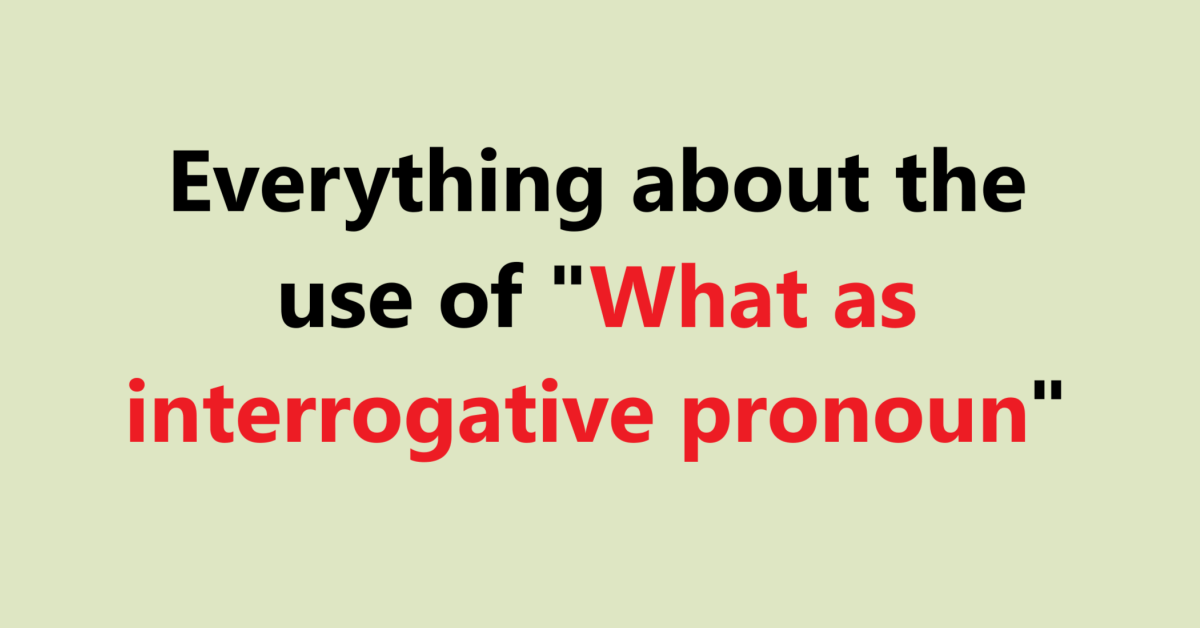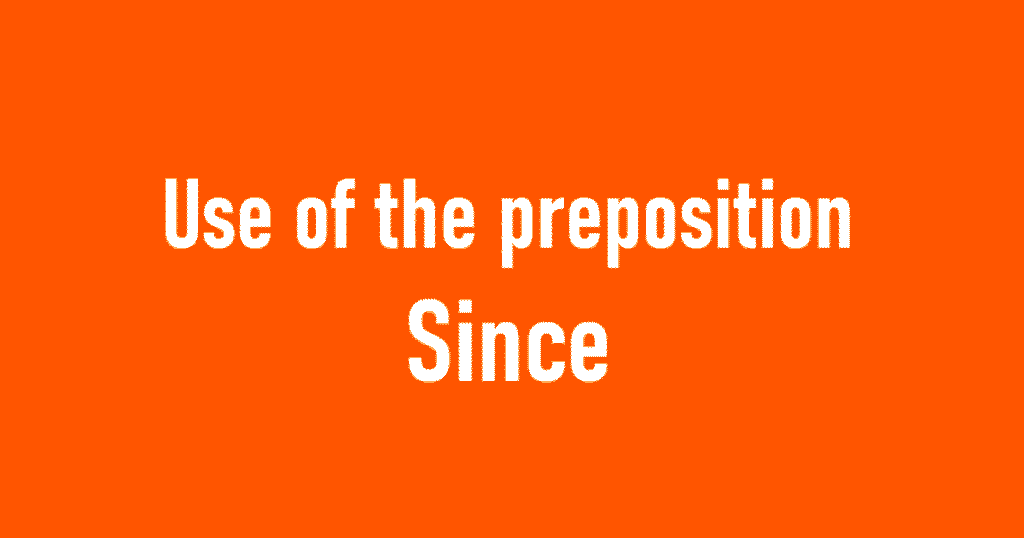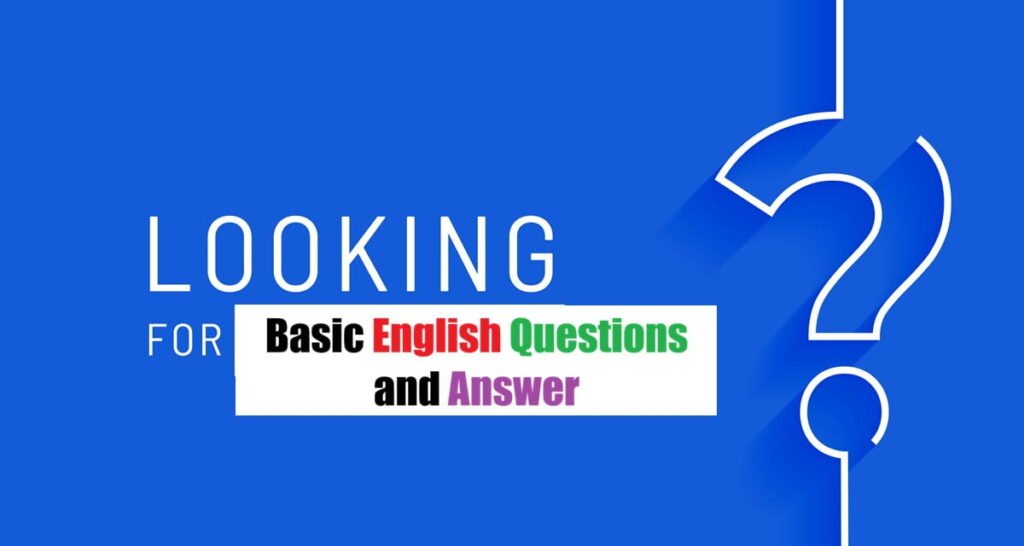Using “what” as an interrogative pronoun is fundamental in English for forming questions and requesting information. Here’s a detailed overview:
Definition
An interrogative pronoun is used to ask questions and can stand alone or function as part of a larger query. “What” specifically seeks information about things, actions, or ideas.
How “What” Functions as an Interrogative Pronoun
- Direct Questions
- “What” is often used at the beginning of a question to inquire about something specific.
- Examples:
- What is your favorite color?
- What do you want for dinner?
- Asking for Clarification
- It can be used to seek clarity or more details about a previous statement or idea.
- Examples:
- What do you mean by that?
- What happened at the meeting yesterday?
- Inquiring About Types or Categories
- “What” can be used to ask about types or categories of things.
- Examples:
- What kinds of books do you like?
- What type of music do you listen to?
- Asking for Information in Various Contexts
- “What” can also be used in different contexts to gather information about various subjects.
- Examples:
- What time does the store close?
- What did you learn in class today?
Variations and Combinations
- What + Noun: To specify what kind of item or subject is being referred to.
- Example: What book are you reading?
- What + Verb: To ask about an action or to clarify a behavior.
- Example: What are you doing?
- What + Prepositional Phrase: For more complex questions.
- Example: What are you thinking about?
- What + Infinitive: To inquire about intentions or plans.
- Example: What to do now?
Indirect Questions
When used in indirect questions, “what” is incorporated into a longer statement to inquire subtly without asking directly.
- Examples:
- Can you tell me what the schedule is?
- I wonder what time it is.
Common Errors
- Inversion: In general questions, remember that the subject usually follows the verb:
- Correct: What is your name?
- Incorrect: What your name is?
- Excessive Use: Avoid overusing “what” in sentences to prevent them from sounding awkward. If clarification is needed multiple times, consider rephrasing.
Tone and Context
- The tone in which “what” is spoken can convey different meanings—curiosity, surprise, confusion, or sometimes disbelief.
- Examples in Tone:
- What? (in disbelief)
- What! (in surprise or shock)
Cultural Nuances
- In conversations, using “what” directly may come across as abrupt in some cultures. It’s often polite to soften the inquiry with phrases like “Could you please tell me what…” or “I’d like to know what…”
Questions and Answers on “What” as an Interrogative Pronoun
Here are 40 questions and answers that illustrate the use of “what” as an interrogative pronoun:
- Q: What is your favorite book?
A: My favorite book is To Kill a Mockingbird. - Q: What time does the meeting start?
A: The meeting starts at 10 AM. - Q: What are you doing this weekend?
A: I’m planning to go hiking with friends. - Q: What kind of music do you like?
A: I really enjoy jazz and classical music. - Q: What are the primary colors?
A: The primary colors are red, blue, and yellow. - Q: What did you eat for breakfast?
A: I had oatmeal and a banana for breakfast. - Q: What is your favorite movie genre?
A: My favorite movie genre is science fiction. - Q: What countries have you visited?
A: I have visited France, Italy, and Japan. - Q: What do you think about the new policy?
A: I think it’s a positive change for the company. - Q: What is the capital of Australia?
A: The capital of Australia is Canberra. - Q: What hobbies do you have?
A: I enjoy painting and playing the guitar. - Q: What’s the weather like today?
A: It’s sunny and warm today. - Q: What is your biggest goal for this year?
A: My biggest goal is to get fit and healthy. - Q: What are you passionate about?
A: I am passionate about environmental conservation. - Q: What did you think of the presentation?
A: I thought it was very informative and well-researched. - Q: What should I wear to the party?
A: You should wear something casual but nice. - Q: What is your dream job?
A: My dream job is to be a travel writer. - Q: What did you learn in school today?
A: I learned about the water cycle in science class. - Q: What makes you happy?
A: Spending time with my family makes me happy. - Q: What are your plans for the holidays?
A: I plan to visit my relatives and relax at home. - Q: What inspired you to pursue your career?
A: My passion for helping others inspired me to pursue healthcare. - Q: What is your favorite type of cuisine?
A: I love Italian cuisine, especially pasta dishes. - Q: What challenges have you faced recently?
A: I’ve faced challenges with time management at work. - Q: What do you enjoy doing in your free time?
A: I enjoy reading and going for long walks. - Q: What was the best part of your trip?
A: The best part of my trip was visiting the ancient ruins. - Q: What did you think of the food at the restaurant?
A: I thought the food was delicious and well-presented. - Q: What skills are important for your job?
A: Communication and problem-solving skills are essential for my job. - Q: What advice would you give to someone starting college?
A: My advice would be to manage your time well and stay organized. - Q: What motivates you to succeed?
A: The desire to make my family proud motivates me. - Q: What kind of pets do you have?
A: I have a dog and two cats. - Q: What topics interest you the most?
A: I’m most interested in technology and psychology. - Q: What do you think about the current political climate?
A: I believe it’s very divisive and concerning. - Q: What is your biggest fear?
A: My biggest fear is failure. - Q: What do you like to collect?
A: I like to collect vintage postcards. - Q: What is your favorite season and why?
A: My favorite season is autumn because I love the changing colors. - Q: What was your first job?
A: My first job was as a cashier at a grocery store. - Q: What do you think is the key to happiness?
A: I think maintaining strong relationships is the key to happiness. - Q: What would you do with a million dollars?
A: I would invest some and donate to charities. - Q: What is one thing you cannot live without?
A: I cannot live without my smartphone for communication. - Q: What makes you feel accomplished?
A: Completing a challenging project makes me feel accomplished.
FAQs about “What” as an Interrogative Pronoun
Here’s a list of frequently asked questions (FAQs) regarding the use of “what” as an interrogative pronoun, along with their answers:
- What is “what” when used as an interrogative pronoun?
- “What” is an interrogative pronoun used to ask questions about things, actions, or ideas, seeking specific information or clarification.
- How do I properly use “what” in a direct question?
- To use “what” in a direct question, simply place it at the beginning of the sentence, followed by a verb and the subject if necessary.
- Example: What is your favorite movie?
- Can “what” be used to ask about categories or types?
- Yes, “what” can inquire about categories or types of items.
- Example: What types of fruit do you like?
- How can “what” be used in indirect questions?
- In indirect questions, “what” can be embedded within a declarative sentence for a more polite or subtle inquiry.
- Example: I wonder what you think about the new proposal.
- What are some common phrases that use “what”?
- Common phrases include:
- What’s wrong?
- What about…?
- What if…?
- Common phrases include:
- Is “what” appropriate in formal writing?
- Yes, “what” can be used in formal writing, but ensure it’s contextually appropriate and not overused. For more formal inquiries, rephrase to sound more polite when necessary.
- Are there specific contexts where “what” may seem rude or abrupt?
- In certain cultures or contexts, using “what” directly may come off as blunt. It’s often courteous to frame questions in a softer manner, such as “Could you please tell me what…”
- Should I use “what” with a noun or verb?
- Yes, “what” can be followed by a noun (What book are you reading?) or a verb (What are you doing?) to complete the question.
- Can “what” express confusion or disbelief?
- Absolutely! The tone in which “what” is spoken can reflect either confusion or disbelief.
- Example: What?! Did you really just say that?
- How do I avoid common mistakes when using “what”?
- To avoid mistakes, remember to use proper sentence structure. For example, ensure the subject comes after the verb in straightforward questions: What do you want? (not “What you want?”)
Conclusion
Using “what” as an interrogative pronoun is essential for communication and gathering information. Its versatility allows it to function in various contexts, from direct inquiries to indirect questions. Understanding how to use “what” correctly will aid in effective conversation and enhance clarity in communication.


